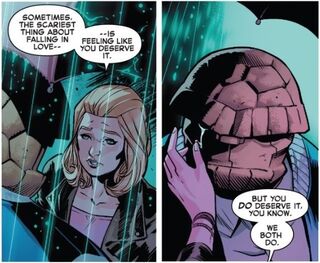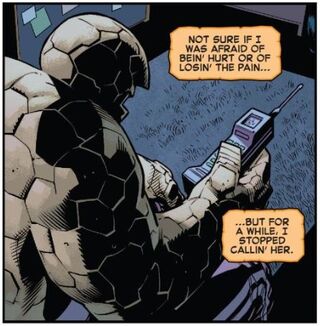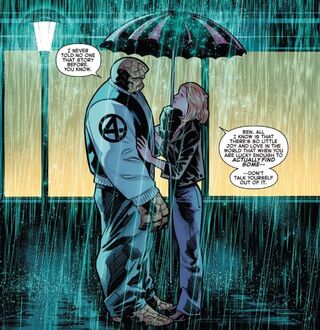Trust
Meet the Ever-Lovin', Blue-Eyed ... and Self-Loathing Thing
The idol of millions shows how feeling inadequate can be overcome with trust.
Posted September 19, 2021 Reviewed by Gary Drevitch

The Marvel Comics miniseries Fantastic Four: Life Story, like its predecessor Spider-Man: Life Story, re-imagines the life and adventures of Marvel's First Family as if they happened in real time, with the characters aging through the decades while they react to real-world events. The series has drawn some criticism for straying too far from established characterizations, especially in its erasure of the close friendship between Reed Richards (Mister Fantastic) and Ben Grimm (the Thing) that predated the four getting their powers, as well as Ben's Jewish faith, but its fourth issue, which introduces Ben's relationship with Alicia Masters focuses on one of Grimm's core character traits: his feelings of inadequacy, especially when it comes to romantic relationships.
In the mainstream Fantastic Four comics, Ben has been involved with Alicia for much of his time as the Thing; the two wed in 2018. But in the Life Story version of events, the two don't meet until the 1990s. They hit it off immediately, but as soon as Ben realizes he is happy, and that he has begun to "feel human" again, his self-doubt creeps in and he backs away from her, unsure if he is afraid of getting hurt or of forgetting the pain he believes is his due in life.

In the mainstream comics, Ben's self-loathing is primarily grounded in his appearance, which he feels makes him both incapable and unworthy of a relationship. In Life Story, Ben explains to Alicia that he also feels tremendous guilt over his experiences in the Korean War: He holds himself responsible for orphaned children, to whom he secretly slipped Army rations while he also participated in bombing their village, becoming their hero without telling them he was part of the reason they needed his help in the first place.
This newly-added story element may contribute to the "realism" of Life Story—and recalls philosopher Nancy Sherman's work on the moral injuries returning soldiers often bear—but is superfluous to Ben's feelings of inadequacy and isolation. Accurate or not, these aspects of his self-image have grounded the character of the Thing for 60 years, and contrast starkly with his countless acts of heroism and sacrifice for a world he feels will always reject him.

But Ben's war story does give Alicia a chance to tell him what many of us need to hear, regardless of how often or how much we deal with issues of self-doubt or self-loathing: Joy and love are too rare, too precious, and too fleeting to let them pass by because you don't think you deserve them.
In the end, Ben has to trust Alicia when she tells him he deserves love—and that she deserves it, too. He needs to trust that she regards him as worthy and that she wants to be with him, not out of pity or kindness, but because she believes he makes her happy.
Like many self-loathing people, Ben thinks that by rejecting Alicia he would be protecting her from disappointment and pain, because he thinks so little of himself. However, he would really be preventing her from making her own choice based on what she knows and feels about him. Only if Ben lets himself love Alicia—and lets her love him back—will he be able to see himself as she does. If he does, in time, his feelings of inadequacy may become a thing of the past.
References
Fantastic Four: Life Story #4 (November 2021). Mark Russell (writer), Sean Izaakse, Francesco Manna, and Nolan Woodard (art), Joe Caramagna (letters).


